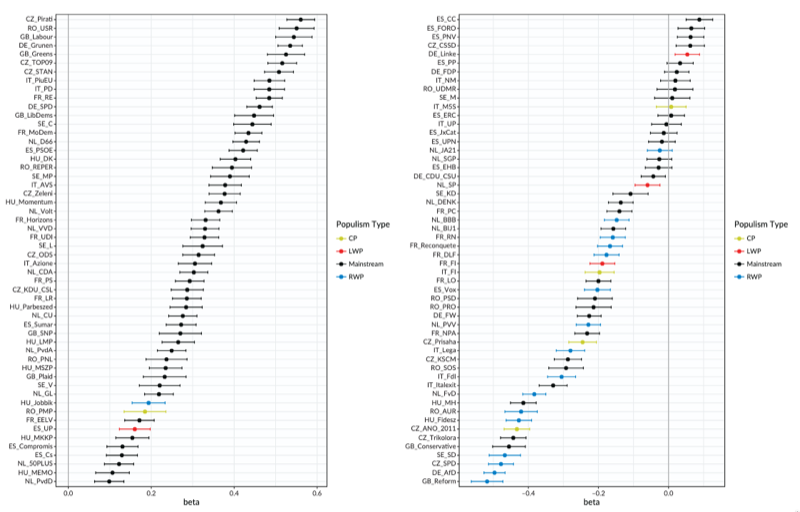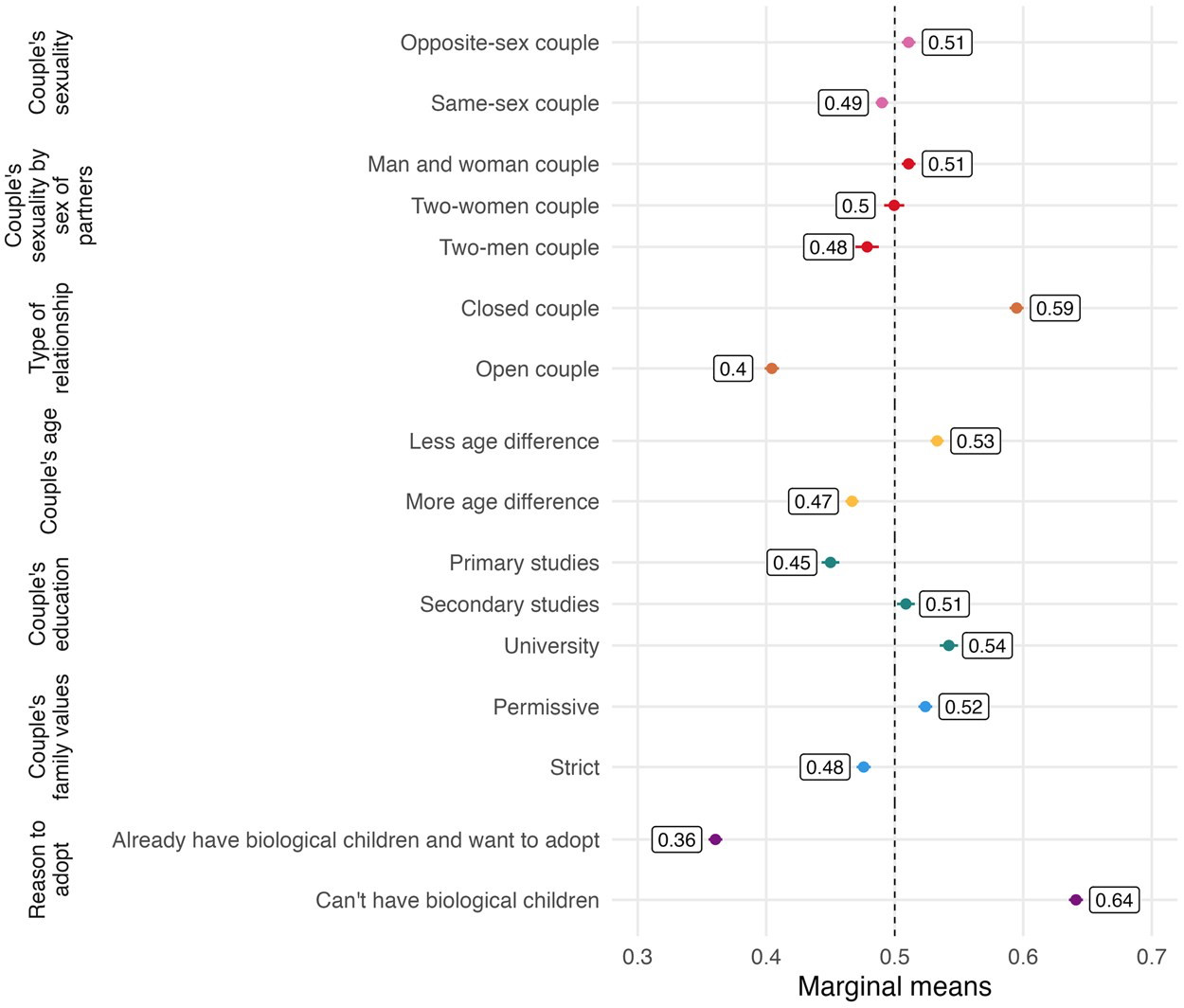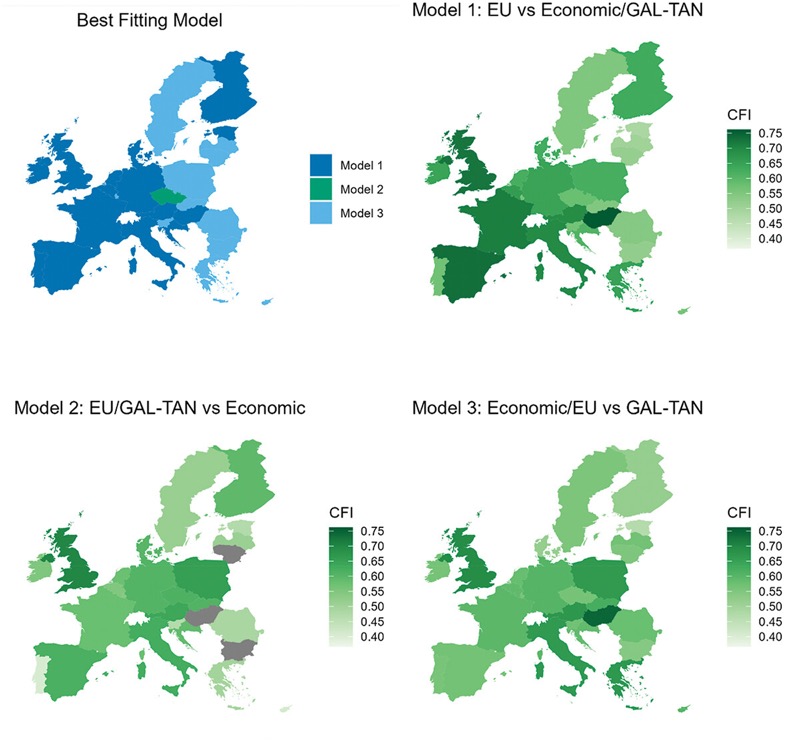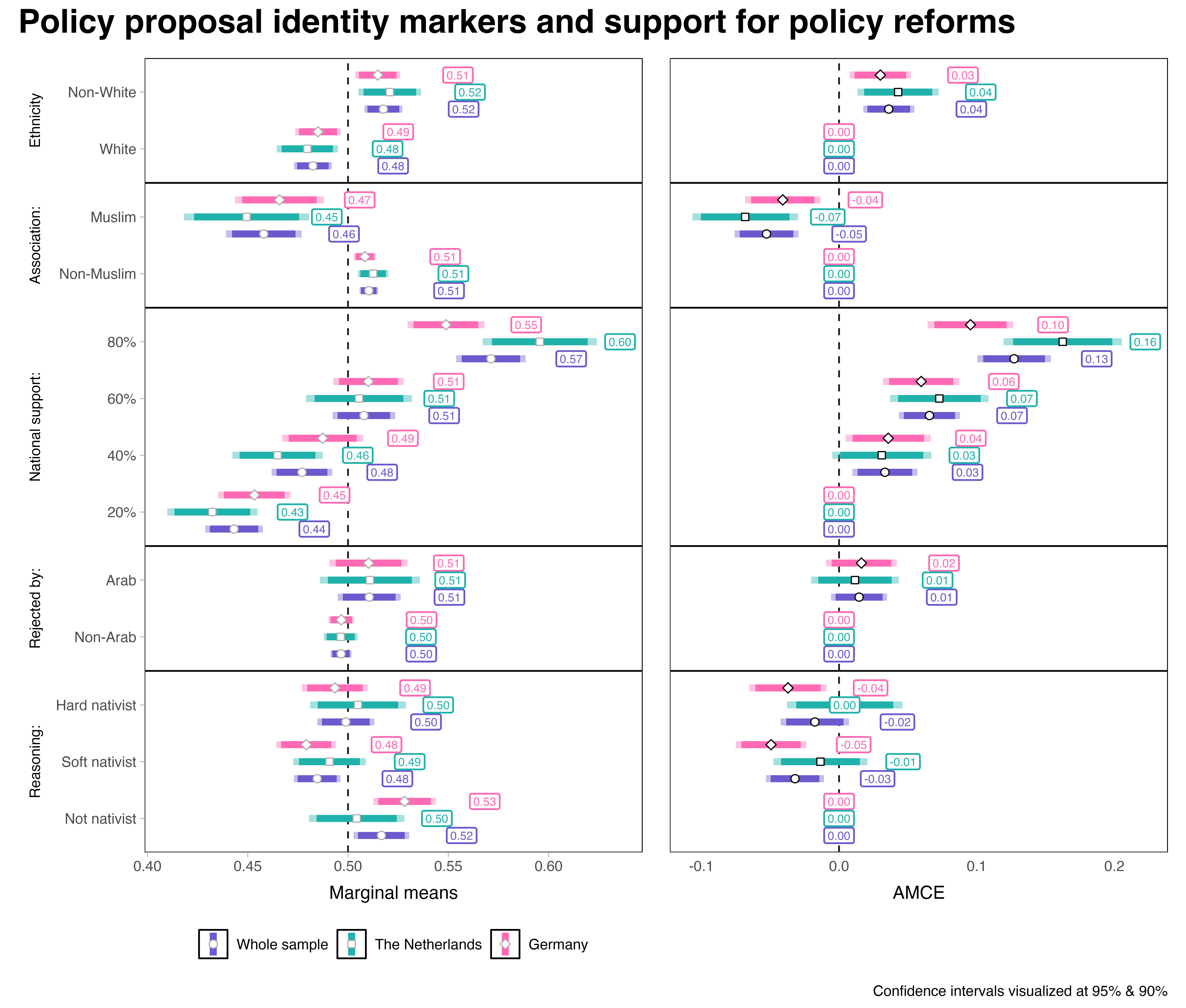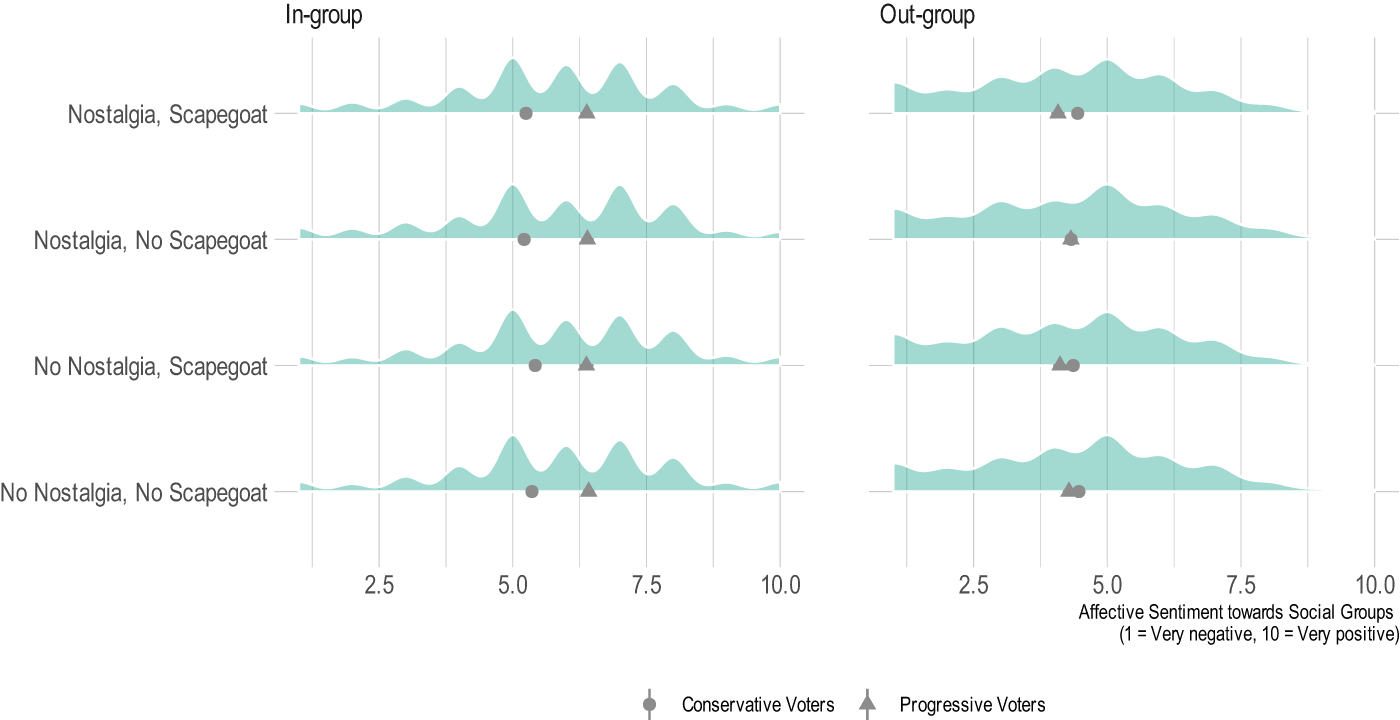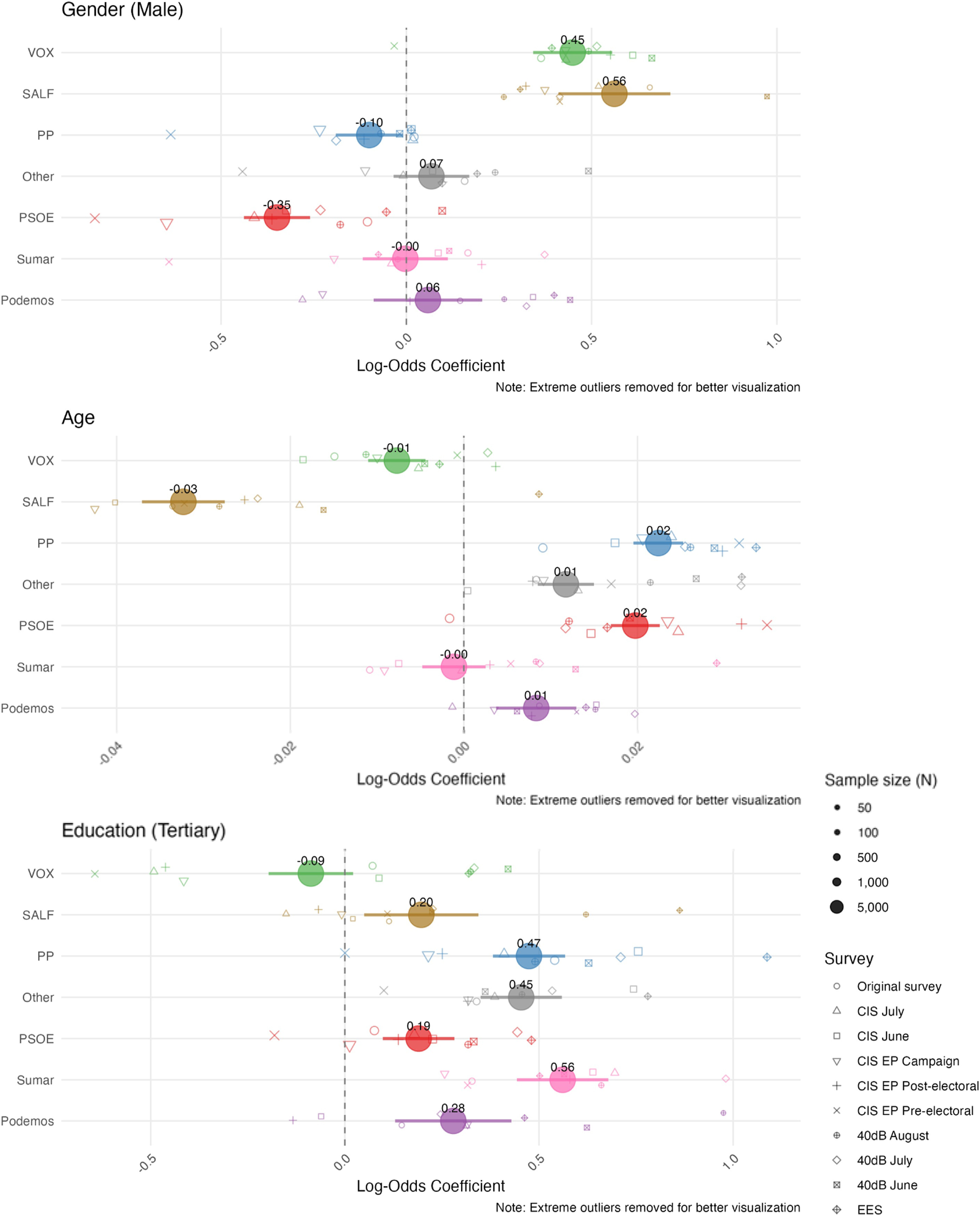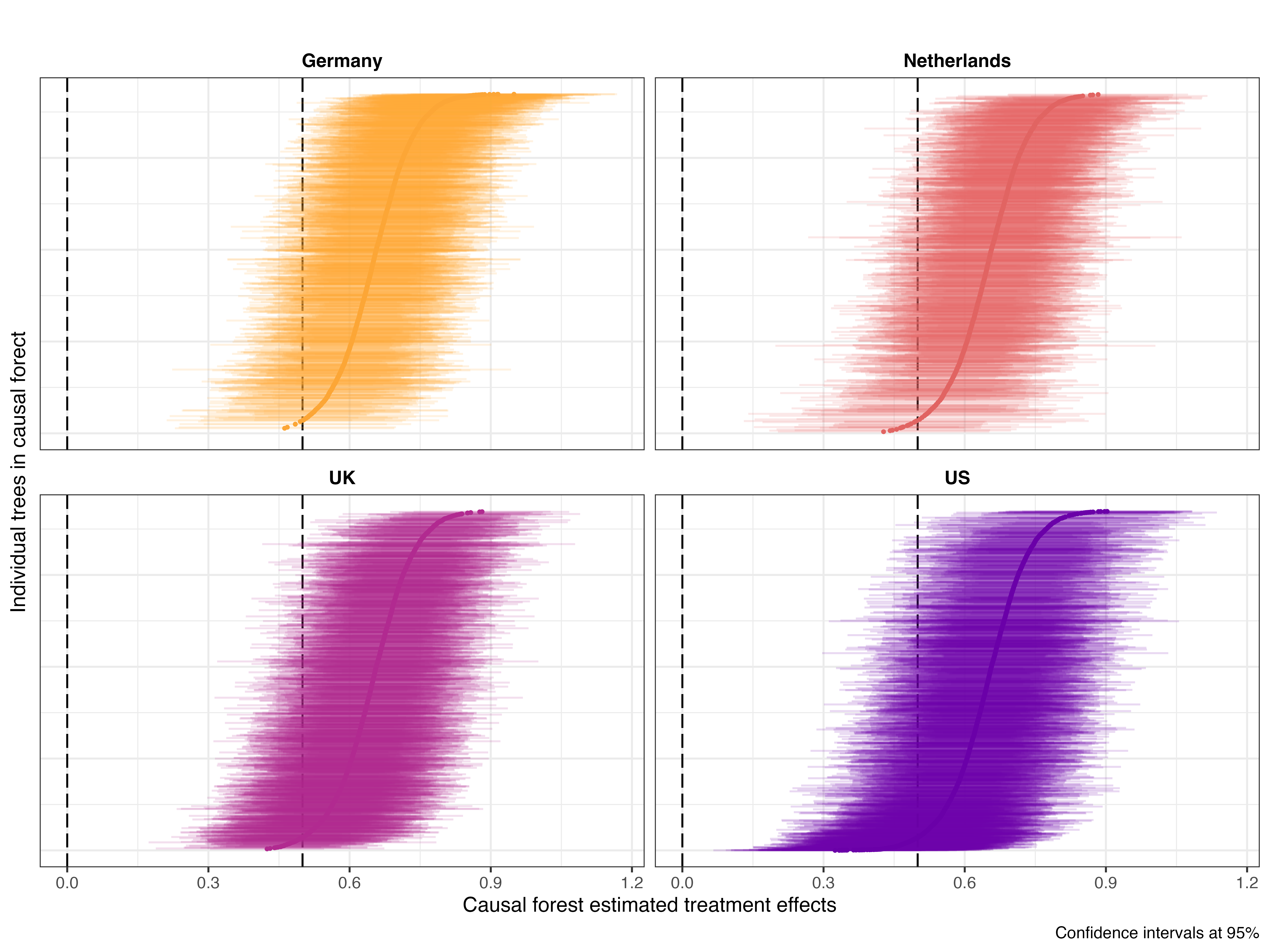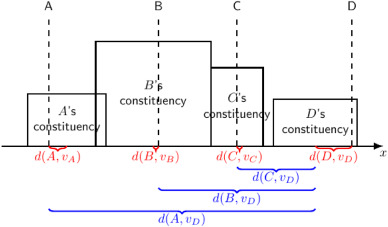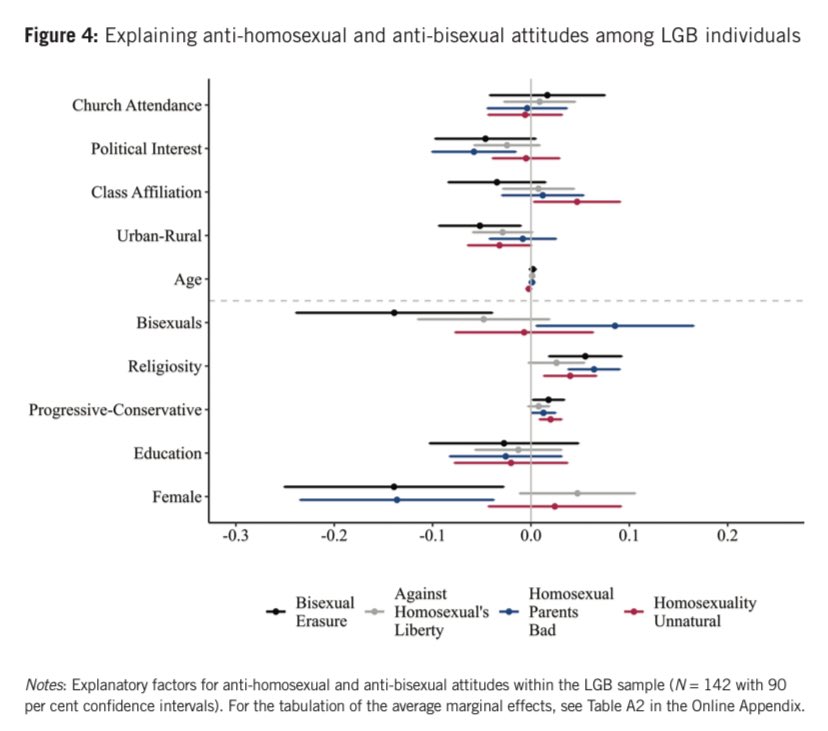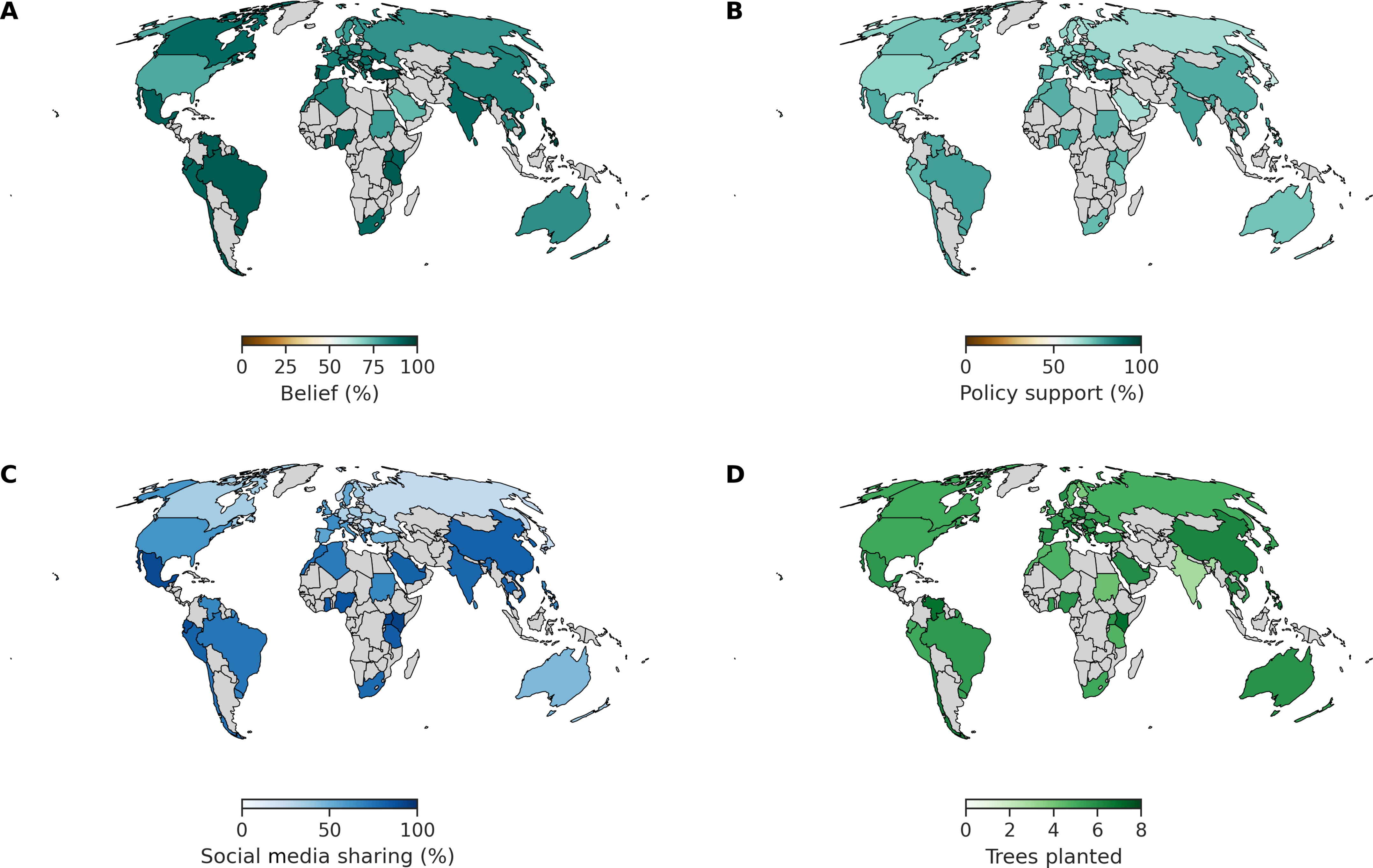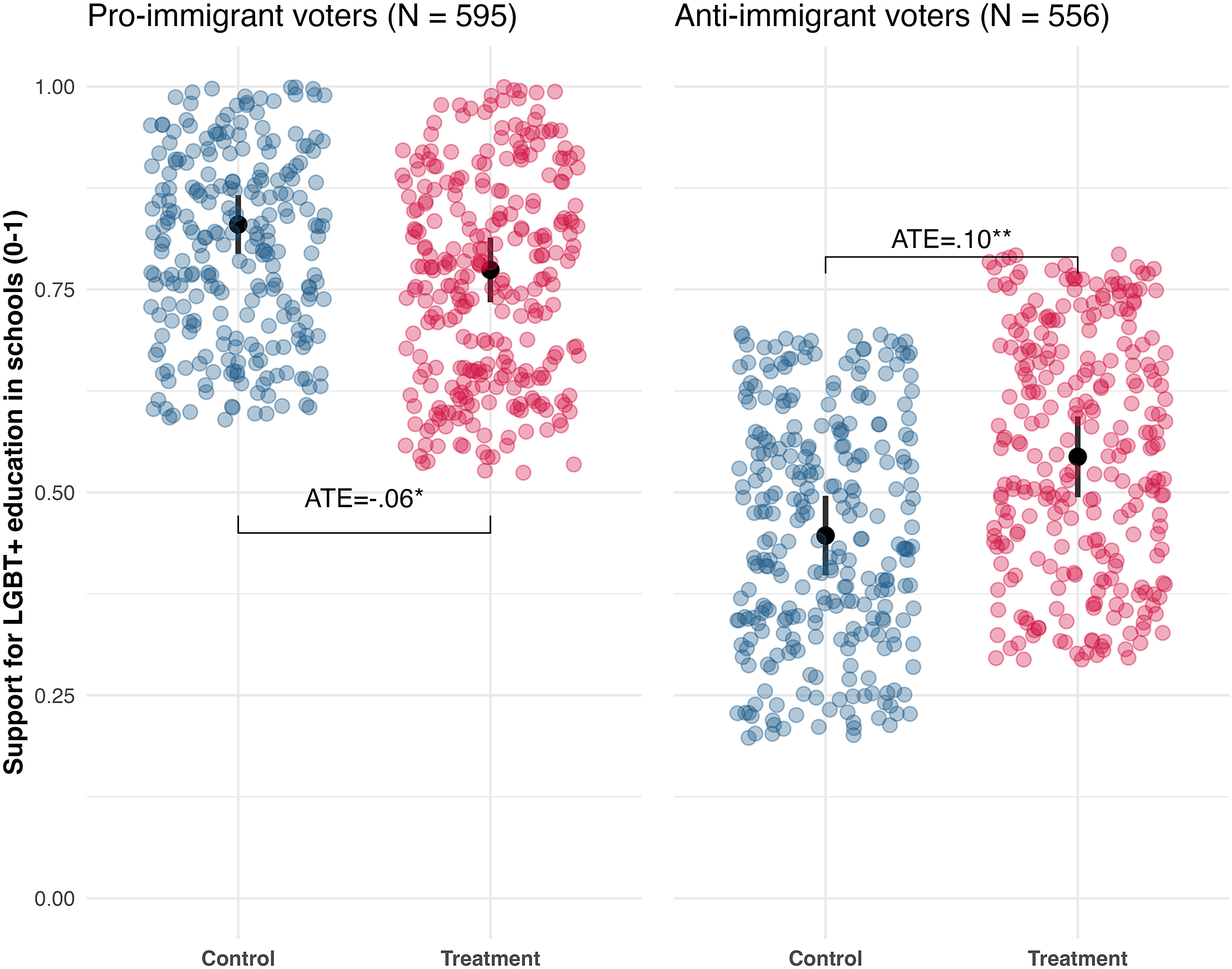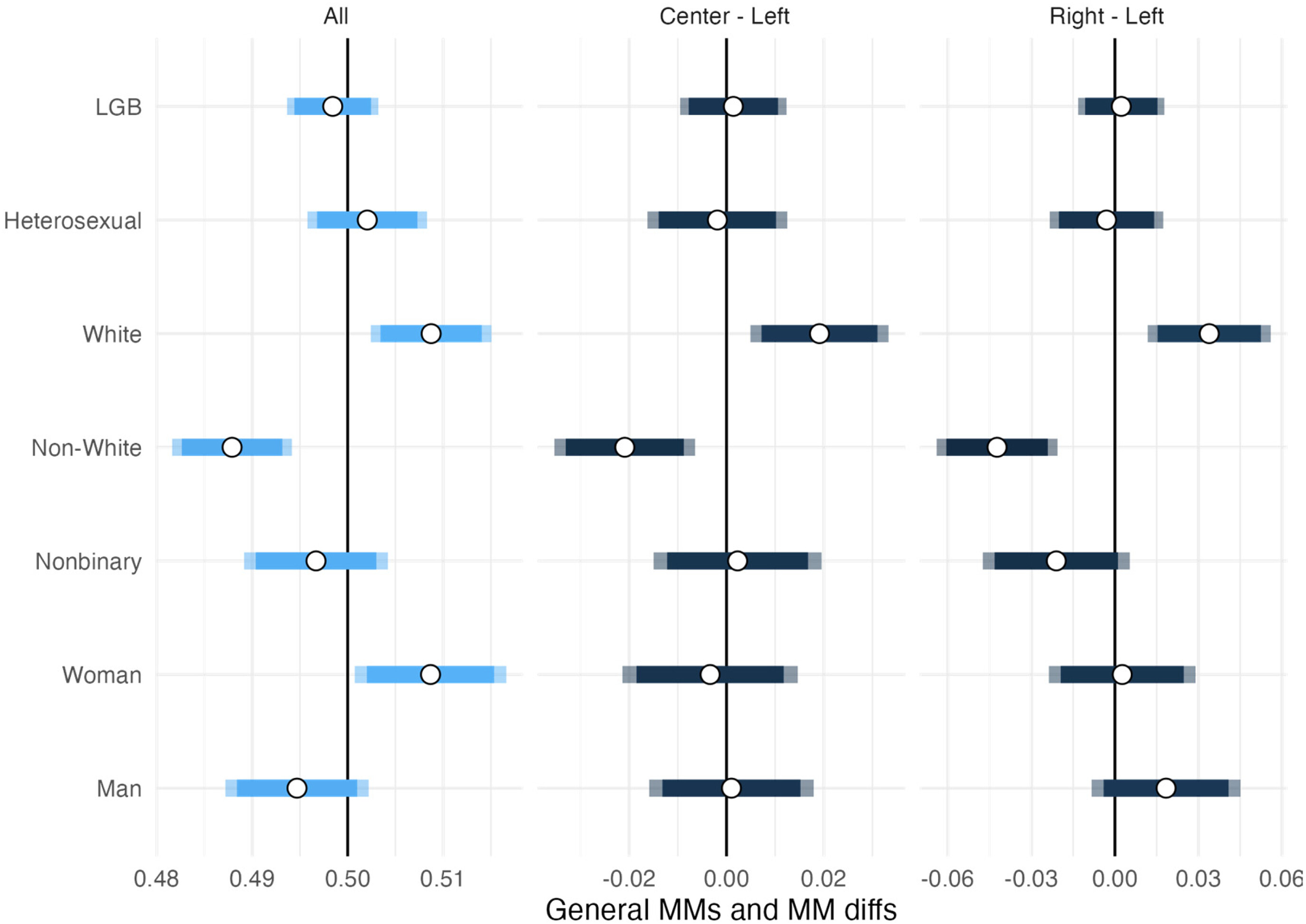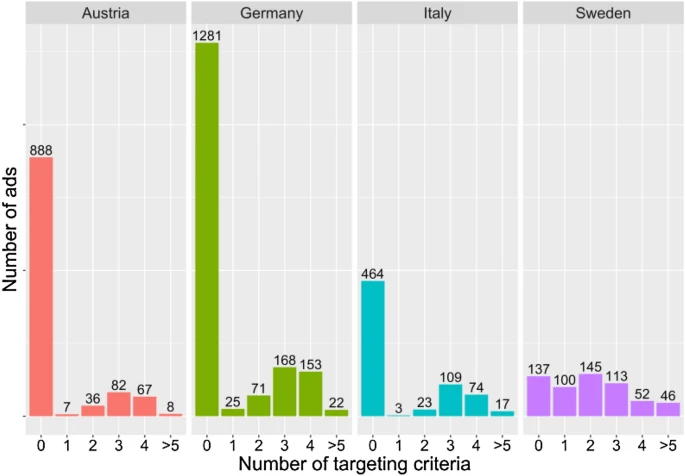publications
publications by categories in reversed chronological order.
2026
- A Populist Axis? Analyzing Connections Between Populist, Economic, and Cultural Dimensions of Political SpaceAndrei Zhirnov , Jan Philipp Thomeczek , Lorenza Antonucci , and 10 more authorsComparative Political Studies, 2026
What makes populist parties successful? What is the contribution of populist ideas to their appeal? How do they affect a voter’s choice? In this article, we treat populist orientation as just another dimension of spatial competition alongside economic and cultural dimensions, and assess its influence on vote choice. Using survey data from nine countries, we place voters and parties along the populist, economic, and cultural dimensions and estimate a spatial model of vote choice. We find that voters’ populist orientations are negatively correlated with their pro-market orientation and positively correlated with their cultural conservatism. We also find that proximity along the populist dimension has a tangible, albeit varying, weight in vote choice. This means that populist appeal can pull populist voters toward populist parties (and non-populist voters toward non-populist parties) even if they do not perfectly align with them on economic and cultural dimensions.
@article{zhirnov2026populistaxis, author = {Zhirnov, Andrei and Thomeczek, Jan Philipp and Antonucci, Lorenza and Scotto di Vettimo, Michele and Buma, Rianne and Cristea, Vlad and Kersting, Norbert and Krouwel, Andr{\'e} and Lange, Sarah and L{\'o}pez Ortega, Alberto and Thompson, Jack and Di Stefano, Roberta and Ruggeri, Fabio}, title = {A Populist Axis? Analyzing Connections Between Populist, Economic, and Cultural Dimensions of Political Space}, journal = {Comparative Political Studies}, year = {2026}, volume = {0}, number = {0}, dimensions = {true}, } - Citizens’ Trust in the European Union During Crisis and Conflicts Across 10 CountriesNorbert Kersting , Lea Schütte , Michele Vettimo , and 10 more authorsPolitics and Governance, 2026
The increasing support for populism is indicative of a profound crisis in European societies. The prevailing cultural narrative posits that support for populist parties, particularly those of a right-wing orientation, is predominantly a reaction to the erosion of nationalistic and religious identities. A growing critique of supranational institutions became visible in some countries. In Europe, populist parties are growing, but Euroscepticism seems to show different trends. Euroscepticism is diminishing and trust in Europe has been growing since 2018 and in particular since 2022. Is there a lack of trust in the European institutions which is reflected in all political parties? What are the reasons for trust and distrust within the political parties in general and within the populist parties in particular? In most countries, the war between Ukraine and Russia is seen as an external threat to the European Union. Did the Covid-19 pandemic and the Ukraine war lead to a "rally around the flag" phenomenon, and is trust in the European Union increasing because of this external hostility? We found evidence of people switching back from populist to mainstream parties and becoming less Eurosceptic, hinting at a "rally around the flag" effect. The study focuses on panel data from voters in 10 countries—Spain, Germany, France, Italy, the Netherlands, the UK, Sweden, Romania, the Czech Republic, and Hungary—from two waves, namely 2018 and 2023, as well as a cross-section of the 2023 wave. The main focus is on supporters of populist parties, which will be compared to mainstream parties. This study thus explores whether the Ukraine war reinvigorated trust in the European Union.
@article{kersting2026trust, author = {Kersting, Norbert and Sch{\"u}tte, Lea and Scotto di Vettimo, Michele and Lange, Sarah and Thompson, Jack and Ruggeri, Fabio and Di Stefano, Roberta and Buma, Rianne and Cristea, Vlad and Antonucci, Lorenza and Krouwel, Andr{\'e} and D'Ippoliti, Carlo and L{\'o}pez Ortega, Alberto}, title = {Citizens' Trust in the European Union During Crisis and Conflicts Across 10 Countries}, journal = {Politics and Governance}, year = {2026}, volume = {14}, pages = {1--21}, dimensions = {true}, } - Not So Sexually Modern After All: Homonegativity and Prejudice Against Open and Age-Gap RelationshipsAlberto López Ortega, and Agustín Blanco BoscoPublic Opinion Quarterly, 2026
How widespread is sexual liberalism in tolerant societies? Theoretical and descriptive evidence suggests an overall liberalization in societal views on topics such as women’s rights and homosexuality. Yet, relying on sexual norms theory, this study unveils persistent sexual prejudice. We differentiate between "normalized" sexual issues, like same-gender marriage, which have gained mainstream acceptance, and "nonnormalized" issues, such as nontraditional sexual practices and relationships, which remain stigmatized. Through a conjoint experiment in Catalonia, Spain, we investigate public attitudes toward adoptive parents with varying sexual orientations, relationship types, and age differences, confirming that discriminatory preferences are prevalent in contexts with low social desirability. By highlighting the continued prejudice against both normative and nonnormative sexual issues, this research contributes to our understanding of the dynamics of sexual attitudes and the challenges facing LGBTQ+ politics and rights.
@article{lopezortega2026poq, author = {L{\'o}pez Ortega, Alberto and Blanco Bosco, Agust{\'i}n}, title = {Not So Sexually Modern After All: Homonegativity and Prejudice Against Open and Age-Gap Relationships}, journal = {Public Opinion Quarterly}, year = {2026}, dimensions = {true}, }
2025
- One model to rule them all? Choosing axes for European political landscapes with VAA dataJan Philipp Thomeczek , Andrei Zhirnov , Michele Vettimo , and 11 more authorsJournal of Information Technology & Politics, 2025
This article investigates the effectiveness of three different two-dimensional models in representing political competition using user data from the EU and I Voting Advice Application for the EU elections from 2009 to 2019. We test different ways of aggregating economic, cultural, and European integration issues to determine which configuration best captures voter preferences across all member states. Our findings show that combining economic and cultural issues into a left-right "super-dimension" alongside a separate dimension for European integration generally offers the most accurate representation across time and space. However, regional variations reveal that this model performs better in Western Europe compared to Central/Eastern Europe, where other models may fit better. To address these regional disparities, we recommend implementing more rigorous pre-testing of common items and considering country-specific or regional adaptations in scaling. These measures could enhance the relevance and precision of VAAs, ensuring they effectively reflect the political landscapes of diverse European regions.
@article{thomeczek2025onemodel, author = {Thomeczek, Jan Philipp and Zhirnov, Andrei and Scotto di Vettimo, Michele and Lange, Sarah and Buma, Rianne and Cristea, Vlad and Dolle, Matthias and Kersting, Norbert and Krouwel, Andr{\'e} and L{\'o}pez Ortega, Alberto and Thompson, Jack and Antonucci, Lorenza and Di Stefano, Roberta and Ruggeri, Fabio}, title = {One model to rule them all? Choosing axes for European political landscapes with VAA data}, journal = {Journal of Information Technology \& Politics}, year = {2025}, dimensions = {true}, } - Selective (il)liberalism: theory and evidence on nativist disidentificationAlberto López Ortega, and Stuart J Turnbull-DugartePolitical Science Research & Methods, 2025
Does group-based tribal thinking against ethnic out-groups condition support for both liberal and illiberal policies? Our thesis is that, irrespective of the direction of the policy (progressive or conservative), nativists express selective support for policies based on different signals of group-identity: descriptive markers, group-based substantive representation, in- and out-group norms, and group-based reasoning. We test this theoretical expectation using a novel AI-powered visual conjoint experiment in the Netherlands and Germany that asked individuals to select between hypothetical educational reform proposals presented by civic actors during a public consultation. Empirically, our results demonstrate that citizens, on average, are indeed selectively (il)liberal and that this instrumental policy support is greater among those with higher levels of underlying nativism. Specifically, we show that – among our multidimensional markers of group-based identities, norms, and reasoning – group-based substantive representation and in-group norms are the strongest determinants of support for diverse reform proposals. These findings have key implications on the malleable nature of citizens’ support for the backsliding of the liberal tenets of democracy as well as the persuasive power of out-group disidentification.
@article{lopezortega2025selective, author = {López Ortega, Alberto and Turnbull-Dugarte, Stuart J}, title = {Selective (il)liberalism: theory and evidence on nativist disidentification}, journal = {Political Science Research \& Methods}, year = {2025}, dimensions = {true}, } - Populism and Polarization: A Nostalgic Narrative of ’Us’ and ’Them’Mariken A.C.G. Velden , Alberto López Ortega, Denise J. Roth , and 1 more authorGovernment and Opposition, 2025
The vast presence of populism in contemporary political discourse has introduced a narrative steeped in nostalgia, evoking images of a revered national past and delineating a stark division between the ‘authentic us’ and the ‘alien them’. While these messages resonate with a substantial portion of citizens, they concurrently foster identity-driven animosity and derogation. In a pre-registered experiment in the Netherlands (with data collected between January and March 2023), we distinguish the influence of nostalgic narratives and scapegoating on societal sentiments, revealing their pivotal role in exacerbating current levels of polarization. Our findings underscore the potential of nostalgic narratives to shape affective sentiments towards ideological and social in-groups, while also influencing sentiments towards out-groups. Messages featuring scapegoats were found to intensify positive sentiment towards in-groups, while simultaneously diminishing positive sentiment towards out-groups. This research underscores a crucial mechanism underpinning the ebb and flow of identity-based sentiments. The results indicate that nostalgic discourse, particularly when intertwined with scapegoating, can serve as a catalyst for the intensification of in-group affinity and the exacerbation of out-group aversion. In essence, our study underscores the far-reaching implications of nostalgic narratives in perpetuating societal animosity and polarization and sheds light on a critical facet of contemporary political discourse.
@article{vandervelden2025populism, author = {van der Velden, Mariken A.C.G. and L{\'o}pez Ortega, Alberto and Roth, Denise J. and Guldemond, Puck}, title = {Populism and Polarization: A Nostalgic Narrative of 'Us' and 'Them'}, journal = {Government and Opposition}, year = {2025}, pages = {1--18}, dimensions = {true}, } - When the Party is Over: Explaining the Rise of the Spanish Far-Right SALFJavier Padilla Moreno-Torres , Álvaro Canalejo-Molero , and Alberto López OrtegaResearch & Politics, 2025
Can a second far-right party succeed in a country where the radical right was, until recently, absent? Spain’s 2024 European Parliament elections provided a striking answer with the emergence of SALF (“Let the Party Be Over”), a far-right anti-politics platform that captured 4.6% of the vote in its electoral debut, outperforming Podemos and the major regional parties. Through a comprehensive analysis of individual-level data from approximately 38,000 respondents across eleven surveys, we provide the first systematic assessment of SALF’s voters and compare them to other Spanish constituencies. First, our findings reveal an intriguing paradox: while SALF voters self-identify as more centrist than supporters of VOX (Spain’s main far-right party), their positions on substantive policies are similarly extreme. In contrast, SALF’s success stems from a distinctive combination of dissatisfaction with democracy and nontraditional media consumption patterns, especially among young male voters. Notably, while VOX’s earlier rise was primarily driven by Spain’s territorial tensions, SALF’s emergence signals a deeper phenomenon: profound disillusionment with Spain’s political system among specific segments of society.
@article{padilla2025party, author = {Padilla Moreno-Torres, Javier and Canalejo-Molero, Álvaro and López Ortega, Alberto}, title = {When the Party is Over: Explaining the Rise of the Spanish Far-Right SALF}, journal = {Research & Politics}, volume = {12}, number = {3}, year = {2025}, dimensions = {true}, } - Far Right Normalization & Centrifugal Affect: Evidence from the Dating MarketStuart J. Turnbull-Dugarte , and Alberto López OrtegaThe Journal of Politics, 2025
Are radical right supporters penalized by a social norm against the radical right on the dating market? This paper investigates this question by leveraging diverse empirical sources, including a unique and behavioral visual conjoint experiment conducted in Britain and Spain. Theoretically, we argue that the radical right is accommodated within the dating market as a result of the affective spillovers among those on the center-right who view dating those from the opposing ideological bloc as more socially costly than dating their own in-bloc partners. Empirically, we test this by examining the behavior of center-right partisans and assessing whether they follow a polity-based norm which places a premium on ostracizing stigmatized parties, or a bloc-logic norm which incentivizes the rejection of out-bloc partisans. The results demonstrate that center-right partisans accommodate the radical right and are actively expected to do so by fellow in-group partisans. Any dating market penalty for radical right partisans is based on the composition of those on the dating market rather than any polity-level norm enforcement. An accommodating bloc-logic in dating preferences among the mainstream right has large normative implications as it suggests that affective polarization and out-bloc rejection between overarching political camps contributes to facilitating the social normalization of radical right supporters who often hold preferences incompatible with liberal democracy.
@article{turnbulldugarte2025dating, author = {Turnbull-Dugarte, Stuart J. and López Ortega, Alberto}, title = {Far Right Normalization \& Centrifugal Affect: Evidence from the Dating Market}, journal = {The Journal of Politics}, year = {2025}, dimensions = {true}, } - Do Citizens Stereotype Muslims as an Illiberal Bogeyman? Evidence from a Double-List ExperimentStuart J. Turnbull-Dugarte , Alberto López Ortega, and Michael HunklingerBritish Journal of Political Science, 2025
Does learning political candidates’ social categories through visual cues affect voter preferences? This paper explores this question by conducting a visual conjoint survey experiment with 2,324 German voters, varying whether respondents received information on candidates through explicit labels or pretested AI-generated candidate pictures. The results confirm our expectations that the way in which social categories are perceived affects preferences, with visual cues having a more significant effect on voter preferences compared to textual cues, leading to more discriminatory preferences for certain social categories. Moreover, we show that the effect of visual cues is moderated by the visibility of social categories, with visible social categories, such as gender binaries and ethnic in-/out-group, eliciting more discriminatory preferences with visual cues. The study sheds light on how visible and invisible social categories affect political candidates’ preferences and emphasizes the importance of considering the intersectionality of social categories and their relationship with ideology.
@article{turnbull2025bogeyman, author = {Turnbull-Dugarte, Stuart J. and López Ortega, Alberto and Hunklinger, Michael}, title = {Do Citizens Stereotype Muslims as an Illiberal Bogeyman? Evidence from a Double-List Experiment}, year = {2025}, journal = {British Journal of Political Science}, dimensions = {true}, } - Trust in scientists and their role in society across 68 countriesTISP teamNature Human Behaviour, 2025
Science is crucial for evidence-based decision-making. Public trust in scientists can help decision makers act on the basis of the best available evidence, especially during crises. However, in recent years the epistemic authority of science has been challenged, causing concerns about low public trust in scientists. We interrogated these concerns with a preregistered 68-country survey of 71,922 respondents and found that in most countries, most people trust scientists and agree that scientists should engage more in society and policymaking. We found variations between and within countries, which we explain with individual- and country-level variables, including political orientation. While there is no widespread lack of trust in scientists, we cannot discount the concern that lack of trust in scientists by even a small minority may affect considerations of scientific evidence in policymaking. These findings have implications for scientists and policymakers seeking to maintain and increase trust in scientists.
@article{colgna2025trust, author = {team, TISP}, title = {Trust in scientists and their role in society across 68 countries}, year = {2025}, journal = {Nature Human Behaviour}, dimensions = {true}, } - How congruent are populist parties with their constituencies? Evidence from the 2019 European Parliament Elections in Italy, the Netherlands, Germany and SwedenAndrei Zhirnov , Jan Philipp Thomeczek , Michele Scotto Di Vettimo , and 5 more authorsElectoral Studies, 2025
The rise of populism in Europe has often been described as a response to representation deficits. Arguably, populist parties (1) contribute to the representation of underrepresented constituencies by taking stances that non-populist parties are too constrained to advocate and (2) make a promise of extreme responsiveness to those frustrated with the lack of representation. In this research note, we investigate whether populist parties are indeed closer to their voters in the policy space than non-populist parties and are more congruent with their constituencies than the other parties are with theirs. Using data from Italy, Germany, the Netherlands, and Sweden, we find that populist parties are indeed often the best policy option for their voters, but the correspondence between their positions and those of their constituencies is on average as good or bad as that between other parties and their voters.
@article{zhirnov2025congruence, author = {Zhirnov, Andrei and Thomeczek, Jan Philipp and Scotto Di Vettimo, Michele and López Ortega, Alberto and Krouwel, André and Antonucci, Lorenza and Di Stefano, Roberta and Kersting, Norbert}, title = {How congruent are populist parties with their constituencies? Evidence from the 2019 European Parliament Elections in Italy, the Netherlands, Germany and Sweden}, year = {2025}, journal = {Electoral Studies}, dimensions = {true}, }
2024
- Visual conjoint vs. text conjoint and the differential discriminatory effect of (visible) social categoriesAlberto López Ortega, and Marco RadojevicPolitical Behavior, 2024
Does learning political candidates’ social categories through visual cues affect voter preferences? This paper explores this question by conducting a visual conjoint survey experiment with 2,324 German voters, varying whether respondents received information on candidates through explicit labels or pretested AI-generated candidate pictures. The results confirm our expectations that the way in which social categories are perceived affects preferences, with visual cues having a more significant effect on voter preferences compared to textual cues, leading to more discriminatory preferences for certain social categories. Moreover, we show that the effect of visual cues is moderated by the visibility of social categories, with visible social categories, such as gender binaries and ethnic in-/out-group, eliciting more discriminatory preferences with visual cues. The study sheds light on how visible and invisible social categories affect political candidates’ preferences and emphasizes the importance of considering the intersectionality of social categories and their relationship with ideology.
@article{lopezortega2024visualconjoint, author = {L{\'o}pez Ortega, Alberto and Radojevic, Marco}, title = {Visual conjoint vs. text conjoint and the differential discriminatory effect of (visible) social categories}, year = {2024}, journal = {Political Behavior}, dimensions = {true}, } - Beyond Homophobia: Investigating the Uniqueness of Biphobic Attitudes Under Consideration of Sexual IdentityConstantin Wurthmann , and Alberto López OrtegaEuropean Journal of Politics and Gender, 2024
With the increasing visibility of Lesbian, Gay, Bisexual, Trans, Queer and other (LGBTQ+) individuals, sociological debates about attitudes towards the group and their intergroup dynamics have intensified. This article investigates the link between factors explaining homophobia and negative attitudes towards bisexuals, often referred to as ‘biphobia’ or ‘bisexual erasure’, using original data collected in August 2021 from Germany (N = 1,342). The study reveals that while factors influencing homophobia and favouring bisexual erasure are similar, they are not identical. Our findings indicate that when bisexual (N = 72) and homosexual (N = 70) individuals are grouped together, they exhibit lower levels of homophobia compared to heterosexuals (N = 1,200). However, we find no significant difference between them and heterosexuals regarding bisexual erasure. This effect is primarily driven by homosexuals’ prejudice towards bisexuals. Furthermore, bisexuals, in comparison with homosexuals, are less likely to disagree with the notion that homosexuals are less capable of being good parents than heterosexuals.
@article{wurthmann2024beyond, title = {Beyond Homophobia: Investigating the Uniqueness of Biphobic Attitudes Under Consideration of Sexual Identity}, author = {Wurthmann, Constantin and L{\'o}pez Ortega, Alberto}, year = {2024}, journal = {European Journal of Politics and Gender}, dimensions = {true}, } - The war on flags: The opposition to state-sponsored LGBTQ+ symbolsAlberto López OrtegaResearch & Politics, 2024
Negativity against LGBTQ+ and gender equality symbols is escalating across Western European countries, including those at the forefront of sexual modernism. Drawing on data from Spain, this paper theorizes and finds that state-sponsored LGBTQ+ symbols receive significantly more negativity than other aspects of LGBTQ+ issues related to general and specific attitudes toward formal rights. The negativity is primarily explained by support for Vox, a radical right-wing party, and age. The study provides insights into the complexities of public opinion surrounding LGBTQ+ symbols, offering a nuanced understanding of the challenges faced by the LGBTQ+ community in terms of acceptance and visibility. Furthermore, it highlights the influence of political affiliations and generational factors in shaping these attitudes.
@article{lopezortega2024war, title = {The war on flags: The opposition to state-sponsored LGBTQ+ symbols}, author = {L{\'o}pez Ortega, Alberto}, journal = {Research \& Politics}, volume = {11}, number = {1}, year = {2024}, publisher = {Sage Publications}, dimensions = {true}, } - Addressing climate change with behavioral science: A global intervention tournament in 63 countriesTISP teamScience advances, 2024
Effectively reducing climate change requires marked, global behavior change. However, it is unclear which strategies are most likely to motivate people to change their climate beliefs and behaviors. Here, we tested 11 expert-crowdsourced interventions on four climate mitigation outcomes: beliefs, policy support, information sharing intention, and an effortful tree-planting behavioral task. Across 59,440 participants from 63 countries, the interventions’ effectiveness was small, largely limited to nonclimate skeptics, and differed across outcomes: Beliefs were strengthened mostly by decreasing psychological distance (by 2.3%), policy support by writing a letter to a future-generation member (2.6%), information sharing by negative emotion induction (12.1%), and no intervention increased the more effortful behavior—several interventions even reduced tree planting. Last, the effects of each intervention differed depending on people’s initial climate beliefs. These findings suggest that the impact of behavioral climate interventions varies across audiences and target behaviors.. The study provides insights into the complexities of public opinion surrounding LGBTQ+ symbols, offering a nuanced understanding of the challenges faced by the LGBTQ+ community in terms of acceptance and visibility. Furthermore, it highlights the influence of political affiliations and generational factors in shaping these attitudes.
@article{tisp2024addressing, title = {Addressing climate change with behavioral science: A global intervention tournament in 63 countries}, author = {team, TISP}, journal = {Science advances}, volume = {10}, number = {6}, pages = {eadj5778}, year = {2024}, publisher = {American Association for the Advancement of Science}, dimensions = {true}, } - Instrumentally inclusive: the political psychology of homonationalismStuart J. Turnbull-Dugarte , and Alberto López OrtegaAmerican Political Science Review, 2024
Best Article Award, European Politics and Society Section, APSA 2025
Can nativist attitudes condition support for LGBT+ rights? The sustained advance in pro-LGBT+ attitudes in the West often contrasts with the greening of anti-immigrant sentiment propagated by nativist supply-side actors. We argue that these parallel trends are causally connected, theorizing that exposure to sexually conservative ethnic out-groups can provoke an instrumental increase in LGBT+ inclusion, particularly among those hostile toward immigration. Leveraging experiments in Britain and Spain, we provide causal evidence that citizens strategically liberalize their levels of support for LGBT+ rights when opponents of these measures are from the ethnic out-group. In a context where sexuality-based liberalism is nationalized, increasing tolerance toward LGBT+ citizens is driven by a desire among nativist citizens to socially disidentify from those out-groups perceived as inimical to these nationalized norms. Our analyses provide a critical interpretation of positive trends in LGBT+ tolerance with instrumental liberalism masking lower rates of genuine shifts in LGBT+ inclusion.
@article{turnbull2023instrumentally, title = {Instrumentally inclusive: the political psychology of homonationalism}, author = {Turnbull-Dugarte, Stuart J. and L{\'o}pez Ortega, Alberto}, journal = {American Political Science Review}, pages = {1--19}, year = {2024}, publisher = {Cambridge University Press}, dimensions = {true}, }
2023
- Do political duos diminish discriminatory voter preferences? Evidence from a combined conjoint experimentAlberto López OrtegaEuropean Union Politics, 2023
In Europe, more and more parties and governments are led by a pair of leaders. What consequences does the presence of duos have on voter preferences? I argue that voters have less discriminatory preferences against untraditional candidates when they choose two leaders instead of only one. However, discriminatory preferences do not entirely vanish; rather, traditionally excluded candidates are often relegated to secondary positions, and there exists a certain threshold of tolerated ticket diversity. Through a novel combined conjoint experiment, I find relative support for this conjecture, especially in the case of ethnic minority candidates. In view of the increasing number of new types of leadership, the results of this study have important implications for the study of political behaviour and elite diversity.
@article{lopezortega2023duos, title = {Do political duos diminish discriminatory voter preferences? Evidence from a combined conjoint experiment}, author = {L{\'o}pez Ortega, Alberto}, journal = {European Union Politics}, volume = {25}, number = {1}, pages = {106--129}, year = {2023}, publisher = {SAGE Publications}, dimensions = {true}, } - Insights into the accuracy of social scientists’forecasts of societal changeThe Forecasting CollaborativeNature Human Behaviour, 2023
How well can social scientists predict societal change, and what processes underlie their predictions? To answer these questions, we ran two forecasting tournaments testing the accuracy of predictions of societal change in domains commonly studied in the social sciences: ideological preferences, political polarization, life satisfaction, sentiment on social media, and gender–career and racial bias. After we provided them with historical trend data on the relevant domain, social scientists submitted pre-registered monthly forecasts for a year (Tournament 1; N = 86 teams and 359 forecasts), with an opportunity to update forecasts on the basis of new data six months later (Tournament 2; N = 120 teams and 546 forecasts). Benchmarking forecasting accuracy revealed that social scientists’ forecasts were on average no more accurate than those of simple statistical models (historical means, random walks or linear regressions) or the aggregate forecasts of a sample from the general public (N = 802). However, scientists were more accurate if they had scientific expertise in a prediction domain, were interdisciplinary, used simpler models and based predictions on prior data.
@article{forecasting2023insights, author = {Collaborative, The Forecasting}, journal = {Nature Human Behaviour}, number = {4}, pages = {484--501}, title = {Insights into the accuracy of social scientists'forecasts of societal change}, volume = {7}, year = {2023}, dimensions = {true}, } - The personality is political (especially for populists)Alberto López OrtegaJournal of Elections, Public Opinion and Parties, 2023
Are elections becoming personality contests? A growing literature is concerned about the increasing personalization of politics and its democratic consequences. This paper argues that part of the phenomenon is due to voters using politicians’ personalities to infer their party and valence and that voters of populist parties are especially able in this inferential task. Using a varying conjoint experiment in Spain, the author certainly finds evidence that the importance of personality decreases when voters learn both about candidates’ party and valence and that this mediating effect is especially relevant for Vox and UP voters. These results dispel concerns about the irrationality of today’s politics by showing that the independent effect of personality is minimal and suggesting that populist voters efficiently use the personality of politicians to infer classical vote determinants.
@article{lopezortega2023personality, title = {The personality is political (especially for populists)}, author = {L{\'o}pez Ortega, Alberto}, journal = {Journal of Elections, Public Opinion and Parties}, pages = {1--20}, year = {2023}, publisher = {Taylor \& Francis}, dimensions = {true}, } - Do all voters appreciate rebels? Ideology moderates valence benefits from factional dissentJohannes Besch , and Alberto López OrtegaThe Journal of Legislative Studies, 2023
Various studies show that voters appreciate individual legislators who dissent against their party as it increases their valence appeal. Simultaneously, political psychology research shows that right voters consider loyalty substantially more important than left voters. However, whether ideology moderates voter reactions to legislator dissent is so far unexplored, similarly to the question of whether voters also appreciate factional dissent of a group of legislators. This article investigates these two questions employing a survey experiment with Spanish citizens. We find that voters indeed appreciate factional dissent and that ideology moderates how voters react to dissent. While left voters welcome all forms of factional dissent more than party loyalty, right voters value party loyalty more than some forms of factional dissent. The results suggest that legislators face different benefits of dissent depending on the ideological composition of their electorate, with important implications for legislator behaviour and party cohesion.
@article{besch2023all, title = {Do all voters appreciate rebels? Ideology moderates valence benefits from factional dissent}, author = {Besch, Johannes and L{\'o}pez Ortega, Alberto}, journal = {The Journal of Legislative Studies}, volume = {29}, number = {1}, pages = {113--134}, year = {2023}, publisher = {Taylor \& Francis}, dimensions = {true}, }
2022
- Are microtargeted campaign messages more negative and diverse? An analysis of Facebook Ads in European election campaignsAlberto López OrtegaEuropean Political Science, 2022
Concerns about the use of online political microtargeting (OPM) by campaigners have arisen since the Cambridge Analytica scandal hit the international political arena. In addition to providing conceptual clarity on OPM and explore the use of such techniques in Europe, this paper seeks to empirically disentangle the differing behaviours of campaigners when they message citizens through microtargeted rather than non-targeted campaigning. More precisely, I hypothesise that campaigners use negative campaigning and are more diverse in terms of topics when they use OPM. To investigate whether these expectations hold true, I use text-as-data techniques to analyse an original dataset of 4,091 political Facebook Ads during the last national elections in Austria, Italy, Germany and Sweden. Results show that while microtargeted ads might indeed be more thematically diverse, there does not seem to be a significant difference to non-microtargeted ads in terms of negativity. In conclusion, I discuss the implications of these findings for microtargeted campaigns and how future research could be conducted.
@article{lopezortega2022microtargeted, title = {Are microtargeted campaign messages more negative and diverse? An analysis of Facebook Ads in European election campaigns}, author = {L{\'o}pez Ortega, Alberto}, journal = {European Political Science}, volume = {21}, number = {3}, pages = {335--358}, year = {2022}, publisher = {Springer}, dimensions = {true}, }
2019
- Public Attitudes on Energy (In)security: Evidence from SpainLala Muradova , and Alberto López OrtegaRevista Española de Investigaciones Sociológicas, 2019
This study investigates how citizens perceive energy security challenges, by analysing an original survey data fielded in a quota sample of Spanish citizens (n=339). Findings demonstrate that energy security in general and the affordability of household electricity prices in particular is of extremely high concern for the citizens. Older citizens in our sample are more worried about the equitable access to energy services than the younger population. Citizens with more education are more aware of energy security risks. Creating closer ties between the public and policy makers, by raising awareness on energy matters and fostering a public debate around the issue of energy security could decrease the mismatch between the energy needs of energy-users and the energy policies, and eventually alleviate energy troubles of the most disadvantaged.
@article{muradova2019public, title = {Public Attitudes on Energy (In)security: Evidence from Spain}, author = {Muradova, Lala and L{\'o}pez Ortega, Alberto}, journal = {Revista Espa{\~n}ola de Investigaciones Sociol{\'o}gicas}, volume = {167}, number = {167}, pages = {19--36}, year = {2019}, publisher = {Centro de Investigaciones Sociol{\'o}gicas (CIS)}, dimensions = {true}, }

